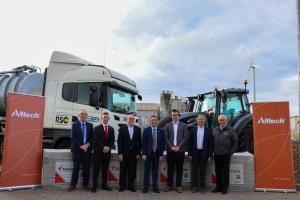DAERA awards £4m to Mid Ulster based successful Sustainable Utilisation of Livestock Slurry SBRI Phase 2 company
Date published:
The Centre for Competitiveness (C for C) has been awarded £4million to help Northern Ireland’s agriculture sector reduce excess phosphorus from livestock slurry, as part of the further roll out of Lough Neagh Action Plan.

The award has been made as part of the Department of Agriculture, Environment and Rural Affairs’ (DAERA) Small Business Research Initiative (SBRI) Phase 2 project under the Sustainable Utilisation of Livestock Slurry (SULS) programme. The consortium of partners which C for C will lead for their “sLurry Utilisation for the Creation and Exploitation of Recoverable Nutrients and Energy” (LUCERNE) project include: CEMCOR, Road Safety Contracts, Tobermore, and Alltech.
While visiting one of the project consortium sites at Tobermore near Magherafelt Minister Muir said: “Today’s announcement sees the launch of the second Small Business Research Initiative (SBRI) Phase 2 project under the Sustainable Utilisation of Livestock Slurry (SULS) programme. The expansion of the SULS programme will further advance and develop demonstrator sites to process livestock manure/slurry to remove excess phosphorus from the environment.
“I am delighted to see this SULS Phase 2 contract being awarded to the Centre for Competitiveness for their LUCERNE project. Working with a range of commercial and academic partners, the Centre for Competitiveness intend to use SULS 2 funded mobile slurry separators to produce feedstock for anaerobic digestion. Ultimately, the Mid Ulster Cluster wishes to build a 10MW biorefinery in the region which will produce biomethane, biofertiliser, low carbon cement and bricks from separated AD digestate in addition to biogenic CO2 and help to develop our circular bioeconomy whilst reducing nutrients in Lough Neagh and other catchment areas aiding improvement of water quality in our rivers, lakes and loughs”
SBRI provides the public sector with innovative solutions to problems that will drive improvement and allows suppliers to develop products and services working collaboratively with the public sector, enabling them to develop new skills, expertise and markets.
Dr Paul Madden, Director at the Centre for Competitiveness added: “We thank Minister Muir for engaging with the group in this innovative project, which has the potential to play an important role in reducing the overall nutrient loading and carbon footprint of the agricultural industry.”
C for C Project Technical Lead, Dr James Young, stated that “this project will ensure the business resilience of farm enterprises with the ever growing need to become more sustainable.”
Minister Muir added; “Today’s announcement in Mid Ulster builds on the recent SULS 2 contract signing of another successful company in County Down and enhances the opportunity to turn a decades long problem into a solution. This is an excellent example of Green Growth in action: reducing emissions, environmental improvements, and producing green jobs. As this project develops it has the potential to radically change the way nutrients are managed and support a sustainable approach to agriculture that benefits our environment and climate .”
Notes to editors:
1. For further information about the Small Business Research Initiative visit https://matrixni.org/sbri/
2. SULS Phase 2 will also provide funding for equipment to separate post-AD digestate to further extract excess P for export, and to produce other marketable products from digestate such as organo mineral fertiliser, peat free compost and low carbon cement, to increase the economic sustainability of nutrient processing.
3. A key target of the SBRI SULS programme, under which the C for C LUCERNE project sits, is to make a significant reduction in on farm nutrient balances by reducing the excess P from slurry by at least 1,000 tonnes per year by the end of year three, with each funded project contributing to this total. The programme will also see further research and development, as well as economic and environmental modelling carried out. The 2020 rePhoKUs report indicated that Northern Ireland has an annual surplus of 6,000 tonnes of P in the phosphorous cycle.
4. The project directly follows on from the SBRI Phase 1 pilot stage from 2023 when £600,000 was awarded to six NI companies to develop proof of concept solutions to address excess phosphorus (P), from cattle and pig slurry within NI agriculture. Following the success of the initial project, the Phase 2 has now commenced and further contracts are expected to be signed in the near future.
5. One focus of this three-year project will be on funding nutrient separation equipment that will separate slurry on farms to produce a compost like material that is high in P, to be used as a feedstock for anaerobic digestion (AD) to produce renewable biogas.
6. RePhoKUs report RePhoKUs Report (Oct 2020) | Agri-Food and Biosciences Institute (afbini.gov.uk)
7. Follow us on Twitter at http://twitter.com/daera_ni and Facebook at: https://www.facebook.com/daerani.gov.uk
8. All media queries should be directed to the DAERA Press Office: pressoffice.group@daera-ni.gov.uk or telephone: 028 9016 3460.
9. The Executive Information Service operates an out of hours’ service for media enquiries only between 1800hrs and 0800hrs Monday to Friday and at weekends and public holidays. The duty press officer can be contacted on 028 9037 8110.